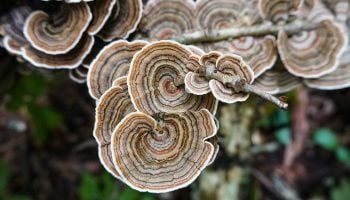SUMMARY
One of the challenges around psychedelic coaching is how abstract and impractical mystical experiences can often sound. Clients may try to articulate ineffable high-dose experiences where they feel a sense of oneness with the universe, but then struggle to explain how such a profound realization can make a practical difference in their everyday lives.
This is why I really like a case report from Tori*, who used a combination of high-dose spiritual work and regular microdosing with psilocybin to reform her otherwise harsh management style.
Tori explains how an experience of universal interconnectedness led her to “soften” her own self-judgement and, then, by extension, to become less angry when her colleagues did not meet her unnecessarily strict standards of performance.
She believes her newfound respect at work directly led to a promotion.
The field of psychedelic science is still grappling with the decision to include mystical measurements in its assessment practices. Still, Tori’s case provides evidence of the benefit of a mystical experience, while also offering a practical example for how to integrate spirituality into a client’s life.
Background on the case
Tori, a mid-career professional in the human rights field, had achieved success in an intense, performance-driven work culture. She was glad to be working in a field that deeply resonated with her values.
As part of her drive to achieve, however, Tori had internalized expectations of perfection and operated according to a self-critical work ethic.
Accustomed to high, exacting standards, she had come to the point where she reacted harshly to any misstep, whether it was hers or someone else’s. In short, she lacked empathy for human error. Her impulse for self-judgement, while understandable in the context of her work environment, was unhealthy and, by her own admission, led her to “break” herself.
In the past, Tori had tried meditation, but it did not stick.
How Psychedelics Made a Difference
Tori says that three high-dose psilocybin experiences prior to microdosing triggered a drastic change in her outlook on life.
Her once narrow and harsh perspective shifted to one of expansive appreciation:
“I just have a much deeper gratitude for my own existence as well as for all creation,” she notes. Moreover, she says “the illusion of separation has eroded for me over time and I have a much deeper sense of interconnection and inter-being with all living matter.” In the end, she says, this “has had wonderful consequences in every part of my life.”
Research has shown that psilocybin, especially in conjunction with spiritual practices like meditation, can bring about so-called mystical experiences that correspond with the interconnected feeling described by Tori. Such experiences often lead to lasting positive changes to one’s personality and worldview. Additional studies of low-dose and short-course psilocybin use have shown increased empathy and prosocial behavior in participants. These reactions are caused by activation of the brain’s serotonin 2A/1A receptors and alteration of the default mode network, a set of linked brain regions that is active when a person is awake but lacking a specific external locus of attention.
With her history of chronic self-criticism, unsuccessful attempts at meditation, and meaningful macrodoses with psilocybin, Tori then began microdosing. Ultimately, it was microdosing that helped her integrate her mystical realizations into her regular professional and personal activities.
Tori explains that, “When I think of my microdosing, it’s so closely linked to a daily spiritual practice.”
Prior to microdosing, she had not found success with meditation. Yet while on a microdosing protocol, Tori was consistently able to meditate and practice mindfulness. This combination significantly improved her relationships with others.
Microdosing, she notes, “has really supported my meditation practice. I’m able to bring a little bit more stillness, compared to what I used to be able to bring.”
For Tori, the synergistic experience of microdosing and meditation has helped create a spaciousness between her thoughts, feelings, and judgements. Rather than impulsively criticizing herself, she now feels a kind of curiosity about her feelings and has a different conception about what matters in life. In her words, “Using psychedelics has just softened a lot of that self-critical impulse.”
Outcomes
Significantly, Tori realized that the way we treat others really does matter; in fact, the way we treat others has a lot to do with the way we treat ourselves. With this understanding, Tori explains:
“I’m able to bring a little bit more grace and compassion to myself, and that then translates into more grace and compassion with other people.”
Tori came to see the continual ebb and flow of her feelings as simply a feature of her mind. She also came to understand her feelings to be teachers, rather than sources of shame. Instead of reacting rashly to a feeling of anger, Tori says that she now gets “curious” about her bodily sensations, whereas in the past she would get wrapped up in a neurotic thought process, inventing a story about how she’s such a bad person because of her anger.
From her starting point of frequent self-censure, which resulted in her often “using the word ‘should’, as in, ‘you should do this’ and ‘I should do that’,” she says she has now stopped. “My self-acceptance has really translated into my language too,” Tori explains.
Tori’s greater empathy and patience with herself had external effects, too.
She now describes herself as “less competitive, less insecure with my colleagues” and “more mindful of trying to see people’s best intentions in an email, or verbal exchange, whatever it may be at work.”
Tori’s greater emotional curiosity, especially on days when she microdoses, has translated into improved focus on particular professional tasks and newfound clarity and empathy:
“I’m able to actually see what the issue is. In the case of a colleague turning in a report late, I am now comfortable engaging with them in a conversation about what led to the tardiness, rather than making up in my head some whole story about how they are lazy or they don’t respect me or they don’t care or whatever.”
These shifts paid off—she was promoted, earning a commensurate 25% increase in her income. Tori feels that this advancement may have been a result of her new insights, which showed her how to interact with colleagues in a better way.
Specific Strategies
Tori had previously experimented with larger doses of psilocybin and knew what she did not want to experience: self-consciousness, paranoia, or the sense of feeling “high”. Instead, she decided to ingest psilocybin in “micro” doses.
Microdosing refers to the ingestion of psychedelics, such as psilocybin or LSD, at doses that do not result in a hallucinatory effect. These microdoses are consumed for a fixed period of time and according to a specific schedule.
Tori began her microdose[1] regimen at 0.16 g of psilocybin, which was too low to bring about any noticeable somatic effects, and after a period of experimenting with varying dosages, found that 0.23 g, every other day, was her “sweet spot”. On microdosing days, she noticed a little expansion of her pupils, slightly brighter colors, and a mild, transient fluttering in her chest.
At microdoses, studies have found that individuals generally do not register either severe or sudden effects; rather, the influence of the psychedelics build over time to produce meaningful and positive psychological and cognitive effects.
Indeed, Tori notes that “for me, microdosing feels gentle, and because I can use it over a sustained period of time, it feels like maybe the changes that psilocybin brings about are more sustained and more integrated, too. I feel like these shifts will be present with me for the rest of my life.”
Tori’s regimen was informed by the Third Wave microdosing course plus her own practice of meditation. While she did not participate in the community aspects of the course, like weekly check-ins, she found the online educational material and the workbook helpful. She also consulted Jim Fadiman’s The Psychedelic Explorer’s Guide—her “Bible”—which she had read before deciding to microdose.
In particular, Third Wave recommended a repeated set of questions that microdosers could ask themselves while journaling about their experience (Tori counts more than a dozen that were helpful for her during a 28-day protocol). She notes:
“I was looking for a microdosing protocol and found the Third Wave course and then the workbook extremely useful. And that’s the only protocol I’ve used and found it really helpful. I like the 16 questions. I like the repetition of the 16 questions on “on” days and “off” days.”
Her protocol on microdosing days was to wake up, meditate, write down her intention for the day, pray, and “enjoy the medicine”, before having breakfast.
While some of the impacts of microdosing have led to major and rapid effects, other shifts are still works in progress. The greater expansiveness that microdosing cultivated in Tori also led to a more flexible conception of herself: “I’ve been able to envisage doing different things.” One of the manifestations of this shift is that she is now actively making plans to transition into a different career that is more aligned with her present values and expanded consciousness.
*Tori is a pseudonym. Some quotes edited for clarity.
[1] It is unknown how Tori obtained psilocybin nor on whose advice she first learned of microdosing and/or decided to pursue this treatment.








WONDERFUL,SIMPLY WONDERFUL
i WOULD LIKE TO KNOW WHAT THE 16 QUESTIONS TORI USED ARE AND HOW TO FIND THEM.
Thank you – we’re so happy you found it helpful!
— Third Wave Team